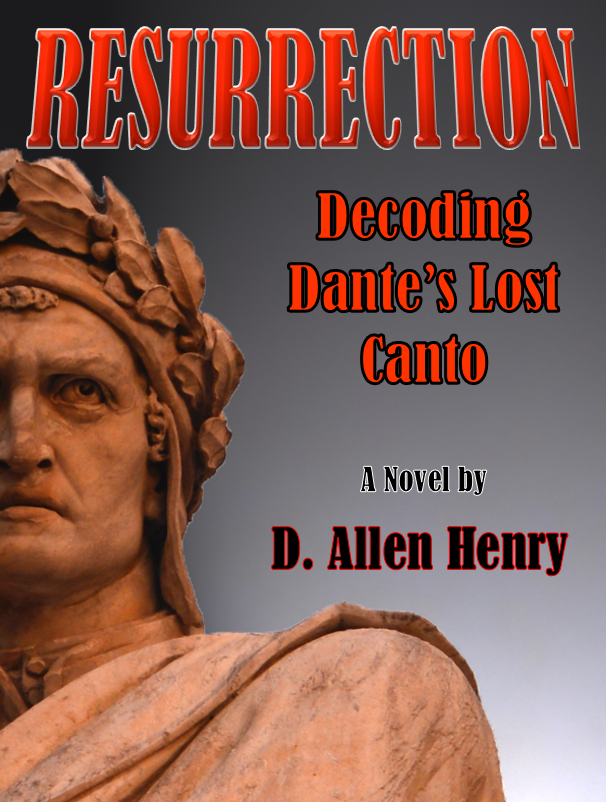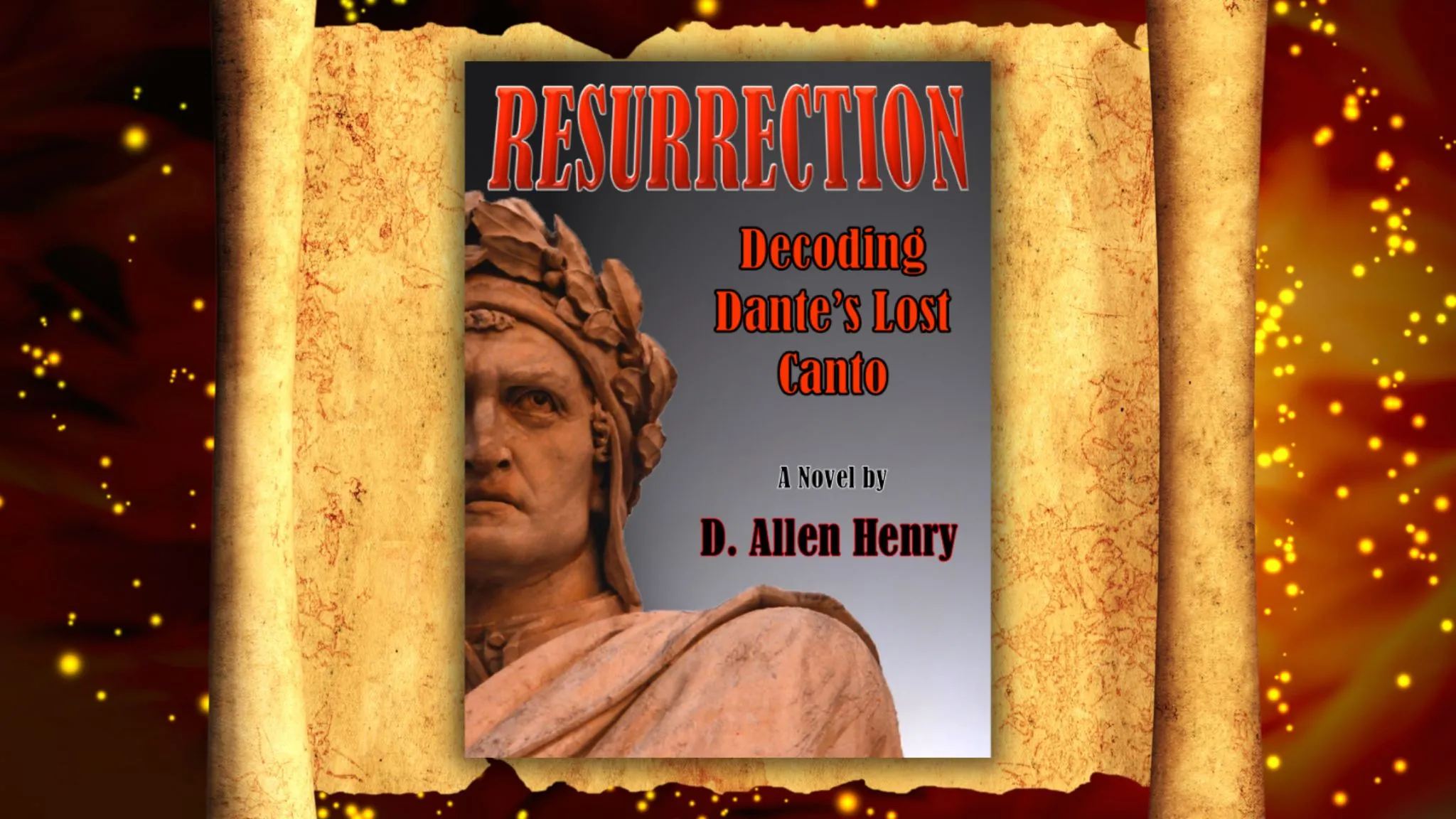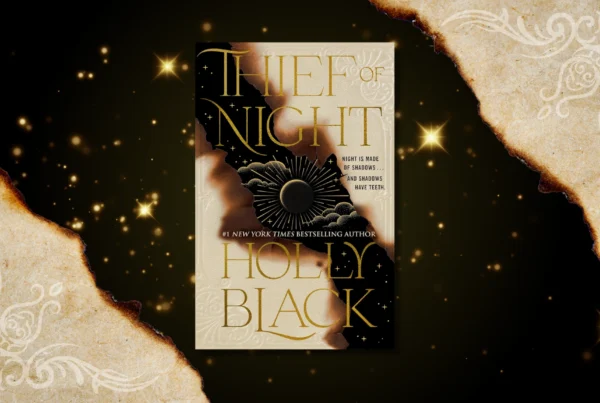The Resurrection: Decoding Dante's Lost Canto by D. Allen Henry
As anyone who has read the Divine Comedy will attest, there were people Italian poet Dante Alighieri liked and those he didn’t like. The former populate his Purgatorio and Paradisio, while the latter — well, let’s just say they are punished, often spectacularly, in his Inferno. His strong views didn’t end there. In fact, Dante’s religiopolitical ties got him kicked out of Florence permanently.
Dante worked on the books in the Divine Comedy until just before his death in 1321 from malaria. But what if it wasn’t malaria that killed him, but a clandestine murder? He must have made a lot of enemies, after all. And what if Dante wrote one thing more: a canto full of clues as to what really happened?
This is the premise of The Resurrection: Decoding Dante’s Lost Canto, author D. Allen Henry’s follow-up to The Starry Message: Galileo’s Lost Prophecy (our review here). In it, Henry returns to the duo of Professor Paul Woodbridge and his wife Antonietta for a clever and compelling mystery that medieval history and literature buffs will devour.
A LOST CANTO FULL OF CRYPTIC MESSAGES
When Cambridge Professor Janice McCarren discovers a purported “lost canto” of Dante at the library of Ravenna, Italy — the city where Dante died — she turns to the experts for help translating and studying it. Paul and Antonietta jump at the chance to examine the lost work of such a historic genius.
Little do they know what awaits for them in Ravenna. What on the surface seems like an academic exercise turns into something much more profound and complex. And also dangerous. Janice’s group of experts soon discover that the canto is full of geographical references to places Dante had visited during his life, along with cryptic hints that point to him being the victim of poisoning … but at whose hands?
Paul and Antonietta set off on a journey across Italy and France to follow in the footsteps of the canto and try to discover the hidden meanings encrypted within it. Along the way, we are treated to a history lesson in the life and times of Dante and the role these various locations might have played in shaping Dante’s work.
Even more importantly, through flashbacks, we are given glimpses into Dante’s potential role in the historical happenings of his era. This is an intriguing take on the genius poet, and Henry builds a legendary figure for our enjoyment.
A TALE OF DANGER AND DISCOVERY
Paul and Antonietta soon discover, however, that they aren’t the only ones retracing Dante’s steps. They are being observed and followed by forces that don’t want the message behind Dante’s last canto to be known. And these forces will stop at nothing to ensure Dante’s secrets remain hidden. But why?
Some very clever twists lead us to the final reveal, as we discover that Dante’s secrets go much deeper than we could have imagined, with repercussions for all of humanity.
Resurrection: Decoding Dante’s Lost Canto is full of the intellectual adventure that historical mystery fans crave. Henry’s expert plotting and pacing keeps the story moving along, and our heroes Paul and Antonietta are a captivating couple with heartwarming chemistry. Henry keeps the historical content interesting, teasing readers along the path of a complex puzzle alongside our sleuths.
Truth and fiction mingle plausibly throughout; readers will enjoy this “what if” as much for its interesting historical tidbits as for its creative liberties. It’s another engrossing tale spun by a storyteller with a knack for bringing the past to life.
 David H. Allen is a university professor and freelance writer. Over the course of his career spanning four decades, he has taught at four major universities within the U.S., as well as three abroad. Having travelled widely, he is multilingual, and has taught forty study abroad programs in twenty countries on four continents. He is the author of six acclaimed college textbooks, more than two hundred research publications, and nine novels (under his penname D. Allen Henry). The author welcomes comments regarding any of his novels (via his website), and if you enjoyed Resurrection, please be so kind as to provide a review of it on the website from which you acquired this book.
David H. Allen is a university professor and freelance writer. Over the course of his career spanning four decades, he has taught at four major universities within the U.S., as well as three abroad. Having travelled widely, he is multilingual, and has taught forty study abroad programs in twenty countries on four continents. He is the author of six acclaimed college textbooks, more than two hundred research publications, and nine novels (under his penname D. Allen Henry). The author welcomes comments regarding any of his novels (via his website), and if you enjoyed Resurrection, please be so kind as to provide a review of it on the website from which you acquired this book.
Buy this Book!
Barnes & Noble




